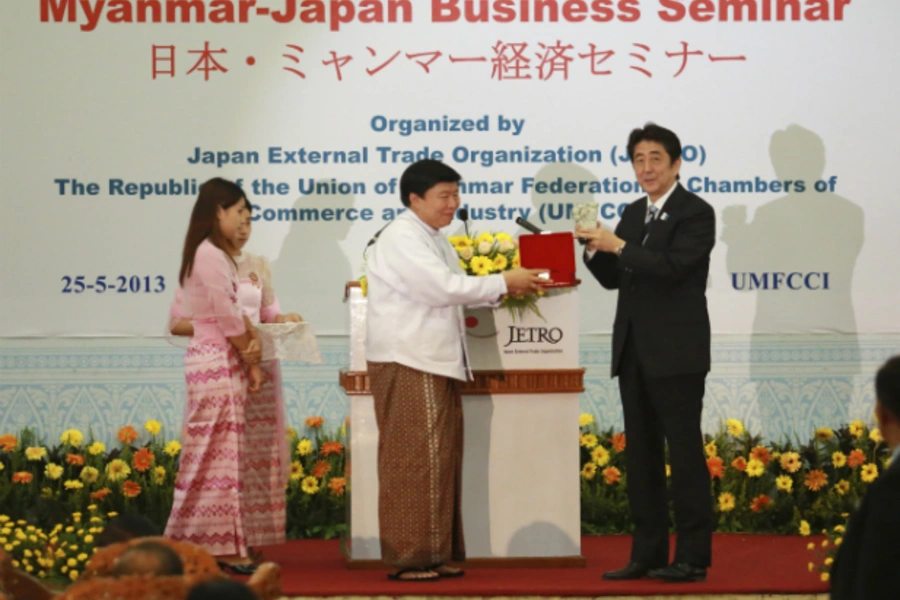The Return of Japan

More on:
When I was doing research in the mid-2000s for my first book, Charm Offensive, on how China was becoming more influential economically and diplomatically in Southeast Asia, I came into the project wondering whether Beijing was, at that time, benefiting from the U.S. being largely absent from Southeast Asia, focused on wars in Iraq and Afghanistan, and unable to get any trade agenda through Congress.
At the time, I concluded that, although China certainly was benefiting in Southeast Asia from a U.S. administration whose attention was directed elsewhere, the biggest loser in terms of influence in Southeast Asia seemed to be Japan. Despite hundreds of billions in aid spent in Southeast Asia since World War II, Japan was being ignored in Southeast Asia in the mid and late 2000s, written off as yesterday’s news—its diplomatic influence shrinking along with its aid budgets, its companies still major investors but hardly the wave of the future. At that time, Japan had endured more than a decade of economic drift, was slashing its aid budgets, and seemed unsure how to respond to a wave of change in Southeast Asia in the 1990s and early 2000s that ended dictatorships in Thailand and Indonesia and opened up politics in many other states. Japanese diplomats and Japanese corporations, had long enjoyed close ties with powerful autocratic leaders in Southeast Asia, like Suharto, but seemed unable or unwilling to leverage Japan’s role as an established democracy to build ties to new democrats emerging in Southeast Asia. The Japanese foreign service in particular, always relatively weak because of the power of other ministries in Tokyo, seemed to be almost conceding Japan’s decline in Southeast Asia.
On the eve of Prime Minister Abe’s most recent trip to Southeast Asia, I have to admit that many of my conclusions about Japan from the time seem wrong, or at least too premature. (I still believe that the United States’ virtual absence from the region in the 2000s put permanent doubts into the minds of many Southeast Asians about whether they could trust the U.S. to maintain a long-term presence in the region as a partner and treaty ally.) Although Japan will never regain the influence it had in Southeast Asia in the 1960s, 1970s, and 1980s, in part because the region has democratized and relations no longer rest on a small handful of Southeast Asian big men, and in part because Japan’s boomiest economic years are not coming back, Japan has leveraged its influence in the region far better in the 2010s.
Tokyo has shed the myth, which was seriously hindered its diplomacy in Southeast Asia, that Japan can no longer punch its weight in the region, and its proactive and deep partnerships with countries like Vietnam and Myanmar—deeper than the United States’ ties with those countries—have differentiated it from U.S. policy in Southeast Asia. Abenomics is inspiring to many Southeast Asian countries, which have tried their own versions of domestic stimulus rather than the austerity of Europe. Japanese companies’ massive asset purchases in Southeast Asia, the failure of Chinese outward investment to match promises by Beijing made in the mid-2000s, and Japanese firms’ willingness to stick with promised Southeast Asian investments despite political turbulence (Thailand, Indonesia, Myanmar) and climate disasters (Thailand) and serious economic slowdowns (Vietnam) garner appreciation in the region. And Prime Minister Abe, far more than most U.S. diplomats, recognizes a truth that China figured out in the late 1990s and early 2000s—although ASEAN moves slowly, and is mostly a talk shop, you have to show up and be counted to be taken seriously as a player in the region. He has now made three visits to Southeast Asia in his relatively short time as prime minister, and his effort is paying off – in trade deals, in investment, in public opinion, and in Southeast Asian acceptance of a more forceful Japanese stance on regional defense.
Yet Tokyo still does too little to differentiate itself from China as a vibrant democracy, and a country whose companies generally have much higher standards of governance than the Chinese firms which have attracted massive backlashes for their investments in Myanmar, Thailand, the Philippines, Vietnam, and even tiny Laos. Except for a few exceptions in the foreign ministry, Japanese diplomats, including many ambassadors in the region, tend to focus on Japan’s aid, its infrastructure investment, and strategic ties, but rarely mention corporate governance, democracy, or civil society. (Japanese diplomats and politicians have begun talking much more, during visits to Southeast Asia, about Japan’s commitment to the environment, which plays well in countries like the Philippines and Thailand with strong environmental movements.) Although Japan has rapidly taken advantage of Myanmar’s shift away from China by boosting economic links and strategic ties, it is too quickly following the old paradigm it used with Suharto, Mahathir Mohamad, and others, focusing too heavily on its ties to a few top leaders. Indeed, Tokyo’s willingness to just embrace the Myanmar government without using its debt forgiveness and new aid packages as leverage to push for continued reforms, even as Myanmar is enveloped in ethnic conflict, is resented by many Myanmar ethnic minority groups, and even by many Myanmar activists.
Prime Minister Abe emphasizes Japan’s role as a democracy, but his nationalist rhetoric and unwillingness to recognize Japan’s World War II war crimes overshadow his emphasis on Japanese democracy as a partner for young Southeast Asian democracies. Even though feelings about WWII are generally not as heated in Southeast Asia as in Northeast Asia—some countries, like Thailand and Myanmar, remember, were de facto allies of Japan—Abe’s rhetoric certainly does not help.
More on:
 Online Store
Online Store